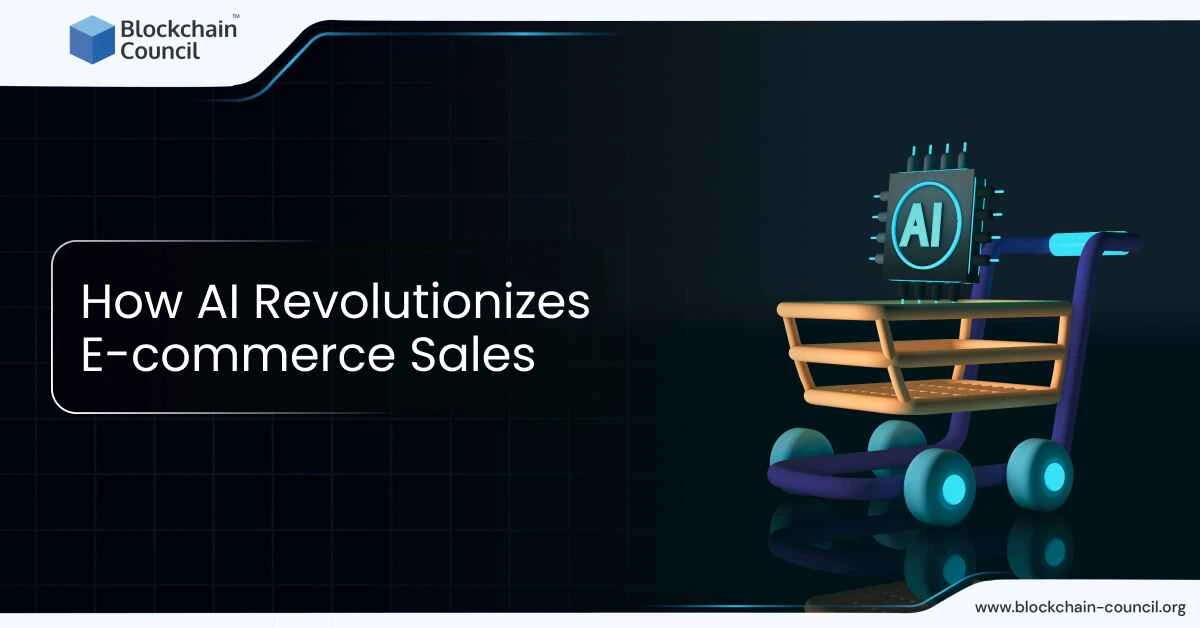
- Blockchain Council
- November 18, 2024
Artificial intelligence, or AI, is changing e-commerce significantly, impacting how businesses connect with shoppers and enriching the online shopping journey. Through tools like predictive analysis, virtual assistants, and AI-driven content, businesses can now create memorable and personalized shopping experiences. These help boost sales and build strong connections with customers.
Personalized Shopping Experiences
A major shift AI has brought to online shopping is the ability to personalize the experience at a detailed level. Traditionally, online stores would suggest items based on what customers previously bought. But now, AI is taking things further, allowing platforms to offer suggestions, pricing, and messaging based on real-time data from browsing history, recent choices, and even current trends.
Take the example of Louis Vuitton, which has a digital shopping assistant built on generative AI. This assistant remembers what each customer likes, recommends matching items, and even shares styling ideas. By replicating a high-end, in-store experience online, it encourages customers to buy more and boosts satisfaction, especially in luxury markets where experience truly matters.
Amazon is another example, using a similar AI assistant called “Project Amelia.” This assistant gives personalized business insights to its sellers, helping with product suggestions, sales ideas, and ways to keep sellers engaged on the platform. This trend of personalizing each interaction with AI is rapidly spreading across the e-commerce world.
Data from G2 shows that customers prefer to interact with brands that seem to understand their needs. Platforms that provide custom recommendations based on a shopper’s interests and habits see higher conversion rates and increased customer loyalty. Studies from AfterShip even show that when stores use AI for product recommendations, people tend to buy more, leading to higher order values.
AI-Driven Content Creation
Another big change AI brings to e-commerce is its ability to produce content quickly while keeping it engaging. By using generative AI, businesses like Michaels Stores can customize their marketing messages for different groups. For instance, by tailoring their email and SMS messages, Michaels improved SMS click-through rates by 41% and saw better engagement with email content.
Walmart also uses AI for content creation, such as writing product descriptions that reflect what customers want. AI helps these descriptions rank better in search engines and creates messages that attract attention. Amazon Ads has taken this further, using AI to generate attractive product visuals, which has led to a notable rise in click-through rates for ads featuring lifestyle images.
The Certified Artificial Intelligence (AI) Expert™ certification can help you understand how AI improves e-commerce sales and boosts customer experience.
Smart Shopping Assistants
AI-powered shopping assistants are proving valuable in customer support and making shopping more efficient. Big retailers like Amazon and Walmart have introduced AI shopping assistants that can help customers find items, answer common questions, and even guide them through the purchase process. These assistants simplify browsing and speed up the process of finding what customers need.
For example, Amazon’s assistant, “Rufus,” launched in 2024 and is already popular. During busy events like Prime Day, Rufus manages customer questions within the Amazon app, providing quick responses and making shopping smoother. By helping customers faster, it also helps raise satisfaction and, likely, sales.
Creating the right AI prompts is essential for success in e-commerce platforms. The Certified Prompt Engineer™ credential gives you the skills to do this effectively.
Improved Product Discovery and Pricing
AI also assists with two important elements of online shopping: finding products and setting prices. With AI, companies can adjust prices instantly, based on things like current demand and what competitors are charging. Using catalog management tools, companies can now price items in real time, maximizing earnings while keeping customers happy with fair prices.
AI also improves product discovery by recommending items based on a shopper’s specific needs. Tools like 35up use cross-selling suggestions to increase average order size by suggesting items that pair well together. This approach not only helps customers find new items but also encourages them to add more to their carts.
Want to learn more about AI in e-commerce? The Master AI Learning Path offers the knowledge to improve sales strategies and customer engagement.
AI in Customer Support
AI-powered chatbots have come a long way, becoming more helpful and responsive than early versions. A beauty brand like Sephora has integrated AI chatbots that provide instant answers to questions and even share beauty advice. These bots handle simpler inquiries, freeing up human support for more complex issues, which ultimately benefits both the business and the customer.
This round-the-clock support has helped stores like Sephora boost conversion rates, as customers can get immediate help instead of waiting for a live agent. Research shows that these AI support systems can improve conversions by around 11%, as they help customers find what they need quickly, creating a sense of support and reliability.
Enhanced Product Imagery
AI also makes it easier for e-commerce brands to manage product images, saving time and resources. For instance, Amazon has introduced an AI-powered tool that creates lifestyle images for product ads. These dynamic images, such as showcasing a product in a kitchen scene, draw more interest by placing items in relatable, everyday settings. Early results show that ads with these AI-enhanced visuals can see up to a 40% increase in click-through rates.
Using generative AI, businesses can also automate tasks like background adjustments, creating a consistent visual feel across products. This approach reduces the need for photo shoots, especially when multiple product variations are involved, helping maintain high-quality visuals across all product listings.
With AI transforming e-commerce, the Certified Artificial Intelligence (AI) Developer™ credential provides the tools to design better systems that drive sales and streamline operations.
The Future of AI in E-commerce
The return on investment for AI-driven tools in e-commerce is clear, with many companies reporting faster and better results. Data from G2 indicates that e-commerce software with AI capabilities leads to quicker results compared to traditional systems, with cost savings and higher sales showing up within months for some businesses. As more brands adopt these tools, AI is expected to become even more refined, further enhancing the shopping experience and building long-term customer loyalty.
Final Thoughts
AI is bringing powerful changes to e-commerce. From helping with product suggestions to refining visual content and supporting 24/7 assistance, it’s clear that AI has become central to modern online shopping. As technology continues to evolve, companies that embrace AI’s potential will likely gain strong advantages, drawing in more engaged customers and seeing greater growth in sales.
With AI impacting e-commerce, our Unlimited Learning Subscription (AI) allows you to always enhance customer experience and increase sales.





































































 Guides
Guides News
News Blockchain
Blockchain Cryptocurrency
& Digital Assets
Cryptocurrency
& Digital Assets Web3
Web3 Metaverse & NFTs
Metaverse & NFTs
